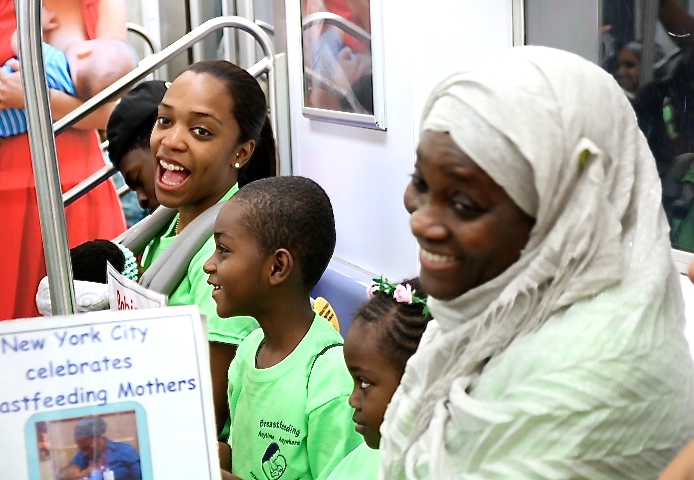Dozens of mothers, advocates and politicians rallied on the steps of New York’s City Hall in August to raise awareness about the importance of breastfeeding.
“Breastfeeding is legal for mommies and their babies anywhere they’re allowed to be in the State of New York,” State Senator Liz Krueger said.
The NYC Breastfeeding Leadership Council sponsored the rally as part of their Annual Breastfeeding Subway Caravan during National Breastfeeding Month.
”It is estimated that if 90% of women breastfed exclusively for 6 months, the U.S. would prevent nearly 900 infant deaths and save $13 billion each year,” Council chairperson Theresa Landau said.
The caravan then traveled by subway to Restoration Plaza in Bedford Stuyvesant, Brooklyn, for a breastfeeding celebration sponsored by the Brooklyn Alliance for Breastfeeding Empowerment (B.A.B.E). The trip was a symbolic reminder of an incident some years ago in which a mother was illegally fined on the subway for indecent exposure while breastfeeding her baby.
The events took place days before the New York City Health Department released a report revealing disparities in the levels of breastfeeding in New York City for babies born to women of color and who live in high-poverty areas.
According to the report, 41 percent of mothers from low-poverty neighborhoods exclusively breastfed in the first five days of birth compared to just 25 percent of mothers from high poverty neighborhoods.
White mothers were more likely to exclusively breastfeed their babies in the first five days of birth compared with Asian/Pacific Islander, Hispanic and Black mothers: 44 percent vs. 24 percent, 26 percent and 27 percent, respectively.
So why is breastfeeding important?
“Babies who are breastfed are less likely to suffer medical problems, such as respiratory illness and ear infections,” the report states. The report also stressed the health benefits to the mother, including lower rates of breast and ovarian cancer and heart disease.
In efforts to get the word out about the positive impact of breastfeeding, the Health Department has introduced community-based initiatives to help educate families.
Matthew A. Morales, male coordinator of the Brooklyn Empowerment Zone, emphasized that all family members, including fathers, have a critical role to play in promoting breastfeeding.
“What we’re trying to do is to create change around infant feeding,” Morales said, adding, “And of course, we are looking at breastfeeding as being the best intervention that everyone has access to.”
Mothers themselves are also working to educate fellow moms and their families. Merowe, a mother from East New York, said, “For anyone who has ever judged it, and never done it, or even tried it and thought it was too difficult, gatherings like this give them more of an incentive to stick it through.”
Photography and additional video by Tricia Cassi





